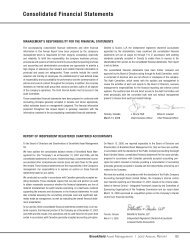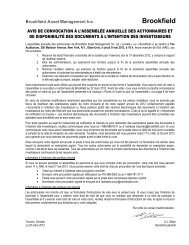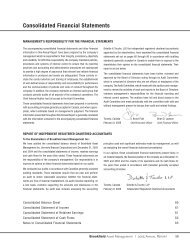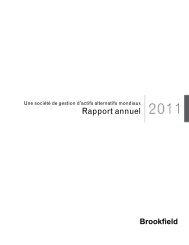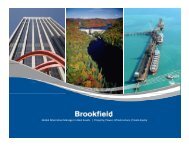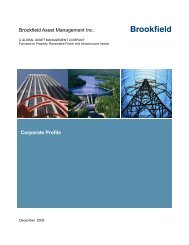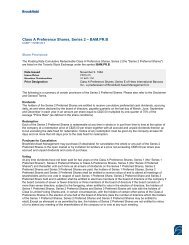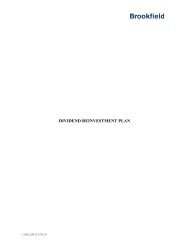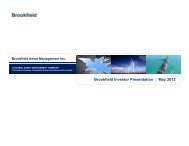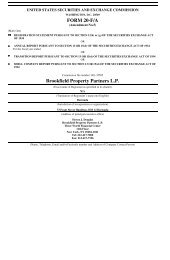FORM 20-F/A Brookfield Property Partners L.P. - Brookfield Asset ...
FORM 20-F/A Brookfield Property Partners L.P. - Brookfield Asset ...
FORM 20-F/A Brookfield Property Partners L.P. - Brookfield Asset ...
- No tags were found...
Create successful ePaper yourself
Turn your PDF publications into a flip-book with our unique Google optimized e-Paper software.
esident in Canada, and of non-resident persons or partnerships the principal source of income of which is one orany combination of sources in Canada (other than an “excluded subsidiary entity” as defined in the Tax Act), thatare held by the “SIFT partnership” and have a fair market value that is greater than 10% of the equity value ofsuch entity, or that have, together with debt or equity that the “SIFT partnership” holds of entities affiliated(within the meaning of the Tax Act) with such entity, an aggregate fair market value that is greater than 50% ofthe equity value of the “SIFT partnership”. The tax rate that is applied to the above mentioned sources of incomeand gains is set at a rate equal to the “net federal corporate rate”, plus the “provincial SIFT tax rate”, each asdefined in the Tax Act.Under the SIFT Rules, our company and the <strong>Property</strong> <strong>Partners</strong>hip could each be a “SIFT partnership” forany taxation year in which either is a “Canadian resident partnership”. Our company and the <strong>Property</strong> <strong>Partners</strong>hipwill be a “Canadian resident partnership” if the central management and control of these partnerships is locatedin Canada. This determination is a question of fact and is expected to depend on where the BPY General Partnerand the <strong>Property</strong> General Partner are located and exercise central management and control of the respectivepartnerships. The BPY General Partner and the <strong>Property</strong> General Partner advise that they will each takeappropriate steps so that the central management and control of these entities is not located in Canada such thatthe SIFT Rules should not apply to our company or to the <strong>Property</strong> <strong>Partners</strong>hip at any relevant time. However, noassurance can be given in this regard. If our company or the <strong>Property</strong> <strong>Partners</strong>hip is a “SIFT partnership”, theCanadian income tax consequences to our unitholders could be materially different in certain respects from thosedescribed in Item 10.E. “Additional Information — Taxation — Canadian Federal Income Tax Considerations”.On July <strong>20</strong>, <strong>20</strong>11, the Minister of Finance (Canada), or the Minister, announced tax proposals to amendthe definition of “excluded subsidiary entity” for purposes of the SIFT Rules. Based on the limited details ofthese tax proposals provided by the Minister, these tax proposals should have no impact on the <strong>Property</strong><strong>Partners</strong>hip’s qualification as an “excluded subsidiary entity”. However no assurance can be given in this regard.In addition, there can be no assurance that the SIFT Rules will not be revised or amended in the future such thatthe SIFT Rules will apply to our company or to the <strong>Property</strong> <strong>Partners</strong>hip.Unitholders may be required to include imputed amounts in their income for Canadian federal income taxpurposes in accordance with existing section 94.1 of the Tax Act as proposed to be amended under taxproposals announced on March 4, <strong>20</strong>10 and contained in draft tax proposals released on August 27, <strong>20</strong>10, if,it is reasonable to conclude, having regard to all the circumstances, that one of the main reasons for theunitholder, our company or the <strong>Property</strong> <strong>Partners</strong>hip acquiring or holding an investment in a non-residententity is to derive a benefit from “portfolio investments” as defined in the Tax Act in such a manner that taxesunder the Tax Act on income, profits and gains for any year are significantly less than they would have been ifsuch income, profits and gains had been earned directly.On March 4, <strong>20</strong>10, the Minister announced as part of the <strong>20</strong>10 Canadian federal budget that theoutstanding tax proposals regarding investments in “foreign investment entities” would be replaced with revisedtax proposals under which the existing rules in section 94.1 of the Tax Act relating to investments in “offshoreinvestment fund property” would remain in place subject to certain limited enhancements. On August 27, <strong>20</strong>10,the Minister released draft legislation to implement the revised tax proposals. Existing section 94.1 of the TaxAct contains rules relating to investments in non-resident entities that could in certain circumstances causeincome to be imputed to unitholders for Canadian federal income tax purposes, either directly or by way ofallocation of such income imputed to our company or to the <strong>Property</strong> <strong>Partners</strong>hip. These rules would apply if it isreasonable to conclude, having regard to all the circumstances, that one of the main reasons for the unitholder,our company or the <strong>Property</strong> <strong>Partners</strong>hip acquiring or holding an investment in a non-resident entity is to derive abenefit from “portfolio investments” in such a manner that taxes under the Tax Act on income, profits and gainsfor any year are significantly less than they would have been if such income, profits and gains had been earneddirectly. In determining whether this is the case, existing section 94.1 of the Tax Act provides that considerationmust be given to, among other factors, the extent to which the income, profits and gains for any fiscal period aredistributed in that or the immediately following fiscal period. If these rules apply to a unitholder, our company or32



